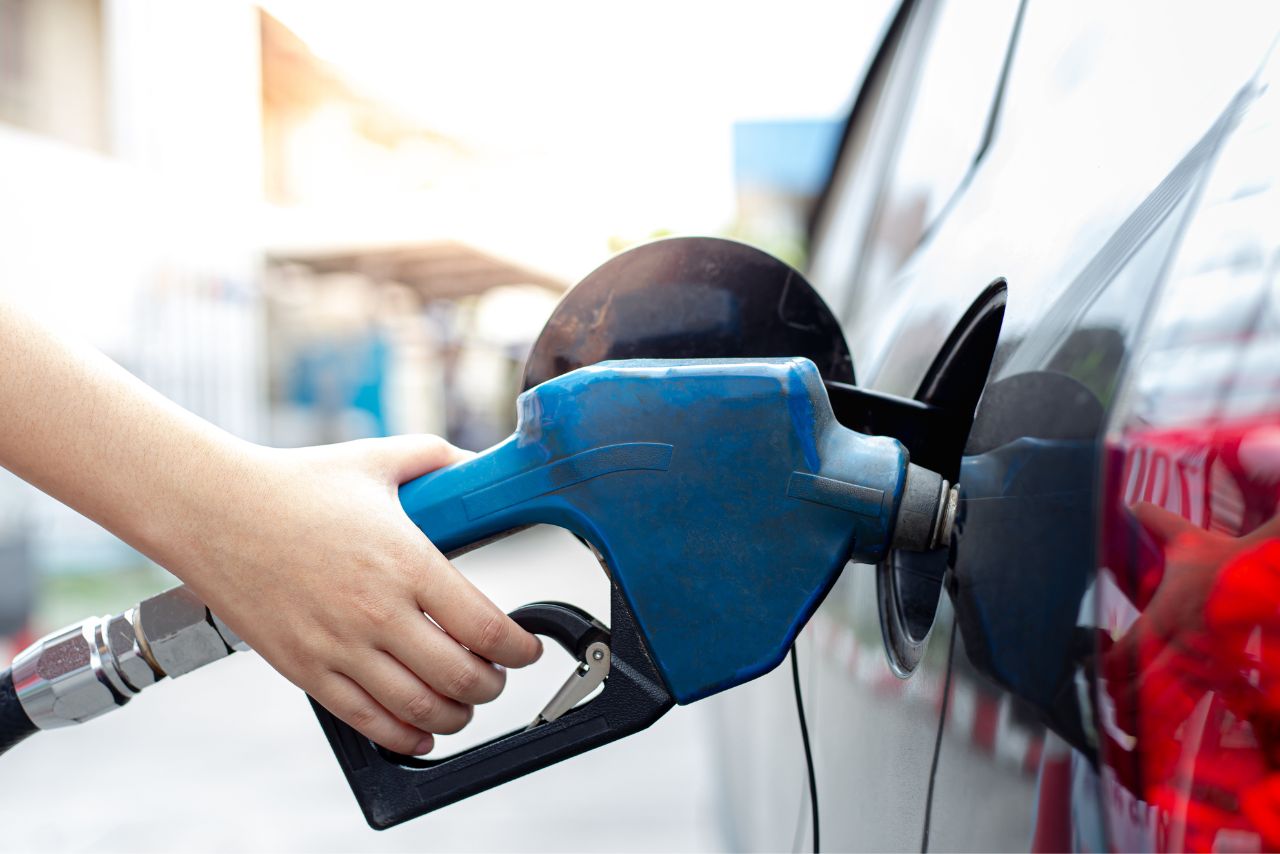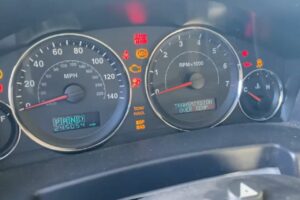If you’re a driver, you’ve likely heard of the term ‘miles per gallon’or MPG. It’s a measure of how many miles your vehicle can travel on one gallon of gas. MPG is an important factor to consider when purchasing a car or planning a road trip.
In this article, How Many Miles Is 1 Gallon Of Gas? we’ll explore the factors that can affect your car’s MPG and give you tips on how to improve your fuel efficiency.
First, it’s important to understand that the number of miles you can travel on one gallon of gas depends on a variety of factors.
These factors include the type of car you drive, your driving habits, the terrain you’re driving on, weather conditions, fuel type, and fuel additives.
By understanding these factors and making adjustments, you can improve your car’s MPG and save money on gas. So if you’re wondering how many miles you can expect to travel on one gallon of gas, keep reading.
On average, a typical car can travel around 25 to 30 miles per gallon (MPG), but this can differ significantly based on factors such as the vehicle’s make and model, driving habits, and road conditions.
Miles per Gallon Calculator
Table of contents
Understanding Miles per Gallon (MPG):
MPG is a measure of how many miles a car can travel on one gallon of gas.
It's a crucial factor to consider when purchasing a car because it determines how much fuel you'll need to travel a certain distance. The higher the MPG rating, the more fuel-efficient the car is.
Several factors affect a car's MPG rating, including its weight, engine size, and transmission type.
Other factors that can affect fuel economy include driving habits, traffic conditions, and weather. It's essential to understand these factors to optimize your car's fuel economy and save money on gas.
With the constant rise in gas prices, the importance of fuel economy cannot be overstated.
Choosing a car with a higher MPG rating can save you hundreds of dollars on gas each year and reduce your carbon footprint.
Factors That Effect Miles Per 1 Gallon Of Gas:
1. Type of Car You Drive:
Depending on the vehicle you're driving, you might get different gas mileage. This is because fuel efficiency largely depends on the type of car you drive.
For example, a compact car like a Toyota Corolla typically gets better gas mileage than a larger SUV like a Ford Expedition.
This is because smaller cars have smaller engines and weigh less, which means they require less fuel to operate.
When it comes to fuel efficiency, there are a few factors that can affect the gas mileage of your vehicle.
One of these factors is the type of engine your car has. Cars with hybrid or electric engines tend to have much better gas mileage than those with traditional gasoline engines.
Additionally, the overall design and aerodynamics of your car can also impact fuel efficiency. Cars with sleek, streamlined designs tend to be more fuel-efficient than boxy, bulky vehicles.
By considering these factors and choosing a car with good gas mileage, you can save money on gas and help reduce your carbon footprint.
2. Driving Habits:
If you tend to accelerate quickly and brake abruptly when driving, you could be decreasing your fuel efficiency by up to 33%, according to a study by the Department of Energy.
Fuel consumption is directly related to the way you drive, and eco-friendly driving habits can significantly improve gas mileage.
Taking a few simple steps can go a long way in reducing fuel consumption and saving you money at the pump.
One of the most effective ways to improve gas mileage is to maintain a steady speed and avoid sudden accelerations or decelerations.
Eco-friendly drivers also anticipate traffic flow, use cruise control on highways, and avoid idling whenever possible.
In addition, keeping your vehicle well-maintained, properly inflated tires, and removing any excess weight can also improve fuel efficiency. By adopting these habits, you can reduce your fuel consumption and help protect the environment.
| Driving Habit | Effect on Fuel Consumption |
|---|---|
| Sudden Acceleration | Up to 33% decrease |
| Maintaining Steady Speed | Up to 20% increase |
| Anticipating Traffic Flow | Up to 10% increase |
| Using Cruise Control | Up to 14% increase |
| Avoiding Idling | Up to 19% increase |
By adopting eco-friendly driving habits, you can improve your gas mileage and reduce your carbon footprint. While it may take some time to adjust to these new habits, the benefits are worth it.
Not only will you save money at the pump, but you'll also be doing your part to protect the environment. Remember, small changes can make a big difference when it comes to fuel consumption.
3. Terrain:
When it comes to fuel efficiency, the terrain you drive on can have a significant impact. Flat terrain typically leads to better gas mileage than hilly terrain due to less resistance.
Similarly, highway driving tends to be more fuel-efficient than city driving due to fewer stops and starts.
Understanding these differences can help you make informed decisions about your driving habits and potentially save you money on gas in the long run.
Flat vs. Hilly Terrain:
Navigating through hilly terrain will require your vehicle to work harder, causing it to consume more gasoline per mile than when driving on flat roads.
This is because the engine has to work harder to climb uphill, which results in higher fuel consumption. Additionally, when going downhill, the engine may need to apply the brakes to maintain a safe speed, which also consumes more fuel.
To illustrate the impact of terrain on fuel efficiency, let's take a look at the following table:
| Terrain | Gas Mileage (mpg) |
|---|---|
| Flat | 25 |
| Hilly | 20 |
| Steep | 15 |
As you can see from the table, driving on hilly terrain reduces your gas mileage by 5 mpg, while steep terrain can reduce it by 10 mpg.
This means that if you're driving a car that gets 25 mpg on flat roads, you can expect to get 20 mpg on hilly terrain and 15 mpg on steep terrain.
The impact of altitude on gas mileage is also worth noting, as higher altitudes can reduce your gas mileage by up to 20% due to the lower air density.
Driving on hilly or steep terrain can significantly reduce your vehicle's gas mileage, causing you to fill up more often. T
o improve your fuel efficiency in these conditions, you can try to drive at a steady speed, avoid sudden accelerations and decelerations, and maintain your vehicle's engine and tire pressure.
Highway vs. City Driving:
Now that we've discussed the impact of flat vs. hilly terrain on fuel economy, let's switch gears and look at another important factor: highway vs. city driving.
The way you drive can have a significant impact on how many miles you get out of each gallon of gas, so it's important to understand the differences between these two driving environments.
When it comes to fuel economy comparison, it's generally accepted that highway driving is more efficient than city driving.
This is because highways are designed for high-speed travel with minimal stopping and starting, which allows your car to maintain a consistent speed and use less fuel.
On the other hand, city driving often involves frequent stops, idling, and slow speeds, all of which can decrease your fuel efficiency.
Additionally, the impact of traffic can be especially significant in city driving, as it can cause you to spend more time idling and accelerating, which can further decrease your gas mileage.
Overall, if you're looking to maximize your fuel economy, it's a good idea to opt for highway driving whenever possible.
4. Weather Conditions:
Ah, the unpredictable weather conditions - because who doesn't love driving through a blinding snowstorm or a torrential downpour with just enough gas to make it to the nearest station? But hey, at least we'll know how far that one gallon can take us, right?
Well, not exactly. The fuel efficiency in extreme conditions is greatly impacted by the weather, and climate change is only making things worse. Here are some factors to consider:
- Temperature: When the temperature drops below freezing, it takes longer for the engine to warm up, and the fuel economy decreases. On the other hand, high temperatures also decrease fuel efficiency due to the increased air resistance.
- Wind: Strong headwinds can decrease fuel efficiency by up to 30%, while tailwinds can increase it by up to 5%.
- Precipitation: Rain and snow can make roads slippery and increase the rolling resistance of the tires, which leads to decreased fuel efficiency.
- Altitude: Driving at higher altitudes means the engine has to work harder to maintain the same speed, resulting in decreased fuel efficiency.
All of these factors combined mean that your fuel efficiency will be lower in extreme weather conditions, and with climate change causing more frequent and severe weather events, it's more important than ever to pay attention to how much gas you have in your tank.
So, next time you're driving through a snowstorm or a heatwave, be aware of how far that one gallon can really take you.
5. Maintenance:
To keep your car running smoothly, you'll need to stay on top of maintenance tasks like regular oil changes and tire rotations. However, when it comes to the fuel efficiency of your vehicle, gasoline quality and fuel storage are just as important.
Poor quality gasoline can lead to decreased fuel efficiency, while improperly stored fuel can cause engine damage.
It's important to choose a reliable gas station and use gas that meets the manufacturer's specifications for your vehicle.
Lower quality gas can contain impurities that can clog fuel injectors and decrease fuel efficiency.
Additionally, storing gasoline for too long can cause it to degrade, which can also lead to decreased fuel efficiency and engine damage.
To ensure the best fuel efficiency, make sure to use high-quality gasoline and avoid storing it for long periods of time.
6. Fuel Type:

Using the correct fuel type for your vehicle is essential for optimal performance and can even save you money on repairs in the long run.
Did you know that using the wrong fuel can cause up to 150,000 engine failures each year?
It's important to know what type of fuel your vehicle requires and to use only that fuel.
Using alternative fuel types, such as ethanol blends or biodiesel, can have benefits for both the environment and your wallet. Here are some of the benefits of using alternative fuel types:
- Ethanol blends can be made from renewable resources, reducing dependence on fossil fuels and decreasing harmful emissions.
- Biodiesel can be made from sources like soybeans or recycled cooking oil, further reducing our reliance on non-renewable resources.
- Some alternative fuel types can be less expensive than traditional gasoline, saving you money at the pump.
The impact of fuel type on engine performance can also be significant. Using the wrong fuel can cause damage to your engine, leading to costly repairs.
Additionally, using a higher octane fuel than your vehicle requires does not necessarily improve performance and can actually decrease fuel efficiency.
It's important to follow the manufacturer's recommendations for fuel type and to choose the highest quality fuel available to ensure optimal engine performance.
7. Fuel Additives:

When considering fuel additives, it's important to understand both the benefits and risks associated with using these products.
There are various types of additives available on the market, each with its own set of advantages and disadvantages.
Finally, it's crucial to carefully weigh the potential benefits against any potential risks before deciding whether to use fuel additives in your vehicle.
Make sure to group complete sentences on their own lines, with a double new line after.
Benefits and Risks:
Although there are benefits to using gas-powered vehicles, it's important to consider the risks they pose to the environment.
Gasoline combustion releases harmful pollutants such as carbon monoxide, nitrogen oxides, and particulate matter into the air, contributing to air pollution and climate change.
This environmental impact has economic implications, as the health effects associated with air pollution cost billions of dollars in healthcare and lost productivity each year.
To better understand the impact of gas-powered vehicles, consider the following table:
| Pollutant | Source | Health Effects |
|---|---|---|
| Carbon monoxide | Incomplete combustion of gasoline | Headache, dizziness, nausea, impaired vision, and death |
| Nitrogen oxides | Combustion of gasoline | Respiratory problems, increased risk of heart disease, and premature death |
| Particulate matter | Combustion of gasoline and diesel | Respiratory problems, heart disease, and premature death |
These pollutants can have serious implications for human health and the environment. It's important to weigh the benefits and risks of gas-powered vehicles and consider alternative transportation options to reduce our reliance on them.
8. Types of Additives:
Now that you've learned about the benefits and risks of using additives in your gas tank, let's delve deeper into the different types of additives available in the market.
Understanding the different types of additives and their impact on your engine's performance is crucial in making informed decisions about what to put in your tank.
When it comes to additives, cost-effectiveness is a significant concern. While some additives may be more expensive than others, they may not always provide the best performance.
It's important to consider the long-term impact of using a particular additive on your engine's health and overall performance.
Additionally, the impact of additives on engine performance varies depending on the type of additive used.
Some additives, such as detergents and dispersants, are designed to keep your engine clean and free of deposits. Others, like octane boosters, improve performance by increasing the fuel's octane rating.
It's essential to understand the purpose of each additive and how it can impact your engine's performance.
Tracking Your Fuel Efficiency:
To keep track of your fuel efficiency, it's important to keep a fuel log. This log should include information such as the date, odometer reading, gallons filled, and total cost.
There are many apps available that can help you track your fuel efficiency and provide valuable insights into your driving habits.
By utilizing these tools, you can identify areas where you can improve your fuel efficiency and save money on gas in the long run.
Keeping a Fuel Log
Keeping a fuel log is essential for tracking how far your car can go on one gallon of gas, so you can save money and reduce your carbon footprint.
By recording the amount of gas you put in your car and the number of miles you drive, you can calculate your car's miles per gallon (MPG). This information can help you identify areas where you can improve your fuel efficiency and implement cost-saving strategies.
To create a fuel log, use a notebook or an app on your phone to record the date, the amount of gas you put in your car, the price per gallon, and the number of miles you drive.
You can use this information to calculate your MPG and track your car's performance over time.
By reviewing your fuel log regularly, you can identify patterns and make adjustments to your driving habits to improve your fuel efficiency.
For example, you may find that you get better gas mileage when you drive at a consistent speed or avoid idling your car for long periods.
With a fuel log, you can make informed decisions about your driving habits and save money on gas while reducing your carbon footprint.
| Date | Gallons of Gas | Price per Gallon | Miles Driven |
|---|---|---|---|
| 01/01/2022 | 10 | $2.50 | 300 |
| 01/07/2022 | 8 | $2.60 | 280 |
| 01/14/2022 | 9 | $2.70 | 320 |
In the above table, you can see an example of a fuel log. By using this type of table, you can easily track your fuel usage and calculate your car's MPG.
By reviewing this information regularly, you can identify areas where you can improve your fuel efficiency and save money on gas.
With a fuel log, you can take control of your car's performance and make informed decisions about your driving habits.
Using an App:
If you want to take your fuel efficiency game to the next level, try using an app to track your car's performance.
Fuel economy calculation is one of the most important features of a fuel tracking app. It helps you understand how much fuel you're using, how far you're traveling, and how much money you're spending on gas.
By keeping track of your fuel economy, you can also identify any changes in your car's performance that might be affecting its gas mileage. Another important app feature for tracking fuel is the ability to store and analyze data.
With an app, you can easily input and store data on your car's fuel consumption, mileage, and other relevant statistics.
You can also analyze this data to identify trends and patterns, such as changes in your car's performance over time.
By using an app to track your fuel consumption, you can gain valuable insights into your car's performance and identify ways to improve your fuel efficiency.
Tips for Improving Your MPG:
By following these easy steps, you can boost your car's fuel efficiency and get more miles per gallon.
- First and foremost, practicing fuel saving techniques is a must for improving your car's MPG. This includes avoiding aggressive driving, maintaining a steady speed, and anticipating traffic flow to minimize the need for sudden braking or acceleration.
- Additionally, eco-friendly driving practices such as carpooling, using public transportation, or biking can also significantly reduce your overall fuel consumption.
- Another important factor in improving your car's MPG is proper maintenance. Regularly servicing your vehicle, keeping your tires properly inflated, and using the correct grade of motor oil can all play a significant role in optimizing fuel efficiency. In fact, studies have shown that proper maintenance can improve MPG by up to 4%.
- Lastly, minimizing your car's weight by removing unnecessary items can also reduce fuel consumption.
By following these simple steps, you can not only save money on gas but also reduce harmful emissions and contribute to a healthier environment.
Frequently Asked Questions:
How does the price of gas affect the miles per gallon of a vehicle?
To optimize fuel efficiency regardless of gas price fluctuations, practice fuel efficient driving techniques like maintaining proper tire pressure and reducing idling time. Regular vehicle maintenance and using a fuel-efficient vehicle also helps.
Can using premium gasoline improve the miles per gallon of a vehicle?
You're a savvy driver who wants to maximize fuel efficiency. Using premium gas is like taking a first-class flight: it can improve engine performance and increase miles per gallon. Fuel additives can also enhance fuel economy, but regular gas can work just as well.
How does the weight of a vehicle affect its miles per gallon?
To improve fuel efficiency, consider your vehicle's weight and engine size. Heavier vehicles require more fuel to move, while larger engines use more fuel. Reduce weight and choose a smaller engine for better miles per gallon.
What impact do traffic jams have on a vehicle's miles per gallon?
Oh, you must be wondering about the impact of traffic jams on fuel efficiency in hilly terrain. Well, let me tell you, it's not pretty. Your driving style also plays a big role in your miles per gallon. Slow and steady wins the fuel efficiency race.
How can driving at different speeds affect a vehicle's miles per gallon?
To improve fuel efficiency, drive at a consistent speed and avoid sudden acceleration or braking. Higher speeds can significantly decrease miles per gallon, while weather conditions like wind resistance and temperature can also impact fuel consumption.
Conclusion and final thoughts 💭
Congratulations! You've just learned about Miles per Gallon (MPG) and all the factors that can impact it.
Now that you understand how MPG works, you can make informed decisions about the type of car you drive, your driving habits, and the terrain and weather conditions you encounter on your journey.
Remember, tracking your fuel efficiency is key to improving your MPG. By using fuel additives and following tips for improving your MPG, you can save money on gas and reduce your carbon footprint.
So go out there and hit the road with confidence, knowing that you have the knowledge and tools to make the most of every gallon of gas. Happy driving!
Latest Posts:
- Can WD-40 Remove Scratches on Cars? (Hint: Yes, but…)
- Can You Use a Drill to Polish Your Car? (We Tried it Out!)
- Should You Cover Car Scratches With Stickers? (REVEALED!)
- Buick Service Stabilitrak: (Causes & 100% Guaranteed Fix!)
- Common Holden Trax Problems (Causes & 100% Proven Fixes!)
- Jeep Commander Transmission Over Temp: (Guaranteed Fix!)











Leave a Reply